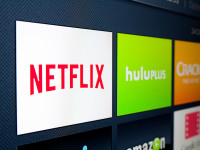This week my regular technology law column (Toronto Star version, homepage version) focused on the long election campaign and the prospect that digital issues might get some time in the spotlight. The column pointed to three broad themes – what comes after Bill C-51, the Trans Pacific Partnership, and a digital strategy 3.0. As part of the digital strategy discussion, I stated that questions abound, including “are new regulations over services such as Netflix on the horizon?”
Prime Minister Stephen Harper addressed that question yesterday with a video and tweet in which he pledged that the Conservatives will never tax digital streaming services like Netflix and Youtube. Harper added that the Liberals and NDP have left the door open to a Netflix tax, but that he is 100% opposed, “always has been, always will be.” Both opposition parties quickly responded with the NDP saying they have not proposed a Netflix tax and the Liberals saying they have never supported a Netflix tax and do not support a Netflix tax.
So is this much ado about nothing?











